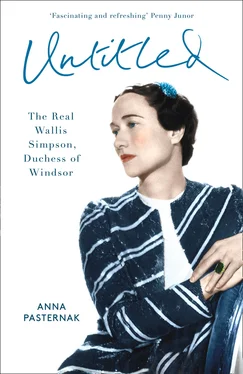Ever since, we have been overfed a diet of fantastical slander: that Wallis was really a man; that she had a perverse psycho-sexual hold over the prince; that she used manipulation and feminine wiles to lure him into abdicating; that she was a ruthless, cold, ambitious bitch, who schemed from the outset to be Queen of England. The well-worn view is that she alone was responsible for almost bringing down the British monarchy, triggering a constitutional crisis caused by her determination to marry the heir apparent. We have experienced her so fully as Machiavellian through others’ projections and prejudice, through misogynistic memoirs, biographies and unflattering portrayals, that she has become a caricature of villainous womanhood. Devoid of warmth, emotional complexity and a beating heart, she remains the brittle victim of salacious chatter and brutal character assassination many decades after her pitiful death.
Instead of simply belittling Wallis and defaming her reputation, we might try to understand this modern, intelligent, remarkable woman and the impossible situation she was placed in. She was, in fact, very warm, funny, irresistibly charming, loyal and dignified to the end. Adored by her many friends, she was written off by a cunning, powerful British establishment who sought to destroy and diminish her; men like Tommy Lascelles – who famously dismissed Wallis as ‘shop-soiled’ with ‘a voice like a rusty saw’ – the British prime minister Stanley Baldwin, and Cosmo Lang, the Archbishop of Canterbury.
However, far from being the villain of the abdication, Wallis was the victim. Instead of pushing for Edward to leave the throne, she had tried to prevent it. What most of her detractors fail to acknowledge is that she never wanted to marry Edward. Naturally she was initially flattered by his attention; as an American woman, living in London surrounded by society hostesses and social climbers, she felt giddy to be included in His Royal Highness’s elegant and rarefied circle. What woman would not have been beguiled by the prince’s ‘unmistakable aura of power and authority?’ According to Wallis: ‘His slightest wish seemed always to be translated instantly into the most impressive kind of reality. Trains were held; yachts materialised; the best suites in the finest hotels were flung open; aeroplanes stood waiting.’ Wallis made no secret of her open-mouthed delight, but she also believed Edward’s interest in her was transitory. She never expected his infatuation to last. In 1935 she wrote to her beloved aunt, Bessie Merryman, in Wallis’s hometown of Baltimore: ‘What a bump I’ll get when a young beauty appears and plucks the Prince from me. Anyway, I am prepared.’
The real tragedy for Wallis is that she could never have been prepared for what was to come, for the speed with which events spun so quickly out of her control. Though worldly, she would find herself painfully out of her depth. Unable to juggle her settled, second marriage to Ernest Simpson with the overwhelming and incessant demands of a besotted prince – whom she and Ernest nicknamed ‘Peter Pan’ – Wallis became the perfect pawn. She did not bargain for Edward’s self-absorbed, possessive and stubborn love for her and his absolute refusal to give her up. Although she valiantly tried to break off the relationship prior to the abdication, it would become impossible for Wallis to ever leave his side.
Probably the biggest lie in this fable is that Wallis lured Edward from his destiny. Her detractors claim that if she had never divorced Ernest Simpson, the abdication would not have occurred. Yet the truth is that she had had no intention of divorcing Ernest. It was Edward, then king, who forced her into this untenable position. In the name of his needy love, Wallis paid the ultimate price: entrapment by a childish narcissist who threw the largest tantrum in history when he could not have the two things he wanted most in the world: Wallis and the throne.
When I began my research, keen to strip away decades of grotesque caricature in an attempt to find the real Wallis, I feared that doors might close. The opposite happened; people were keen to talk with me and I found that those close to the story did not hold Wallis in contempt. Many powerful, key players who had led the charge against Mrs Simpson were now dead. The late queen mother, then Elizabeth, Duchess of York, for one, was furious that Edward’s abdication might force her highly strung and physically weak husband, Bertie, onto the throne and dehumanised Wallis as ‘that woman’ and ‘the lowest of the low’. The spite meted out to Wallis by certain members of the royal family was staggering. Those of Wallis’s friends who are still alive seem to finally feel freer to speak about the injustice they witnessed. Sitting in elegant drawing rooms in London, Paris, Gstaad and Marbella, interviewing those who knew Wallis, I heard the same sentiments echoed; that she was witty and diverting company; that the duke was self-absorbed and less engaging. That Wallis, possessed of perfect manners, behaved with laudable inner strength and dignity, despite the terrible slurs and insults hurled at her. ‘The world adored him ,’ Hugo Vickers said of the Duke of Windsor, ‘yet the people who knew him and worked for him, had reservations about him. The world hated her but the people who knew her and worked for her, absolutely adored her.’
None of those with whom I spoke recognised the wicked Wallis of the history books. Repeatedly, I heard of her kindliness, sense of fun and depth of friendship, which contradicted the public image of a hard-nosed, shallow woman. The closer I got to Wallis’s true character, the greater my incredulity and mounting fury that the world has judged her unfairly and unkindly. She certainly was no saint, but she was far from the sinister manipulator depicted in many accounts. Her friends noted in their diaries and memoirs their warmth and respect for Wallis, yet these tender recollections never seemed to gain sufficient attention. ‘She was so affectionate, a loving sort of friend – very rare you know,’ wrote Diana Vreeland. ‘Women are rarely that sort of friend to each other.’ Wallis was similarly loyal to male friends, too. The Conservative MP Sir Henry ‘Chips’ Channon said: ‘She has always shown me friendship, understanding and even affection, and I have known her to do a hundred kindnesses and never a mean act.’
Wallis was viciously derided at the time of Edward’s abdication and then kept at a distance, denied the opportunity to change public mistrust and misgivings about her. When the scandal broke in the press, she was, understandably, devastated. ‘The enormity of the hatred I had aroused and the distorted image of me that seemed to be forming in minds everywhere went far beyond anything I had anticipated even in my most depressed moments,’ she later wrote. ‘I became obsessed by the notion that, in a manner impossible for me to comprehend, a calculated and organized effort to discredit me had been set afoot.’
She was right. So sensational were the press reports and fevered gossip in 1936 – Mrs Simpson was ‘gold digger’, ‘a whore’, ‘a sorceress’, ‘a Nazi spy’ – that many of the British and European aristocracy, meeting her for the first time, were taken aback. The woman they encountered was nothing like her vulgar fictional persona. ‘I was absolutely flabbergasted when I first met the duchess,’ recalled Count Rudolf Graf von Schönburg. ‘She was the complete opposite of everything we had heard about her.’
Count Rudi became a close friend of the Windsors, after meeting them in the early sixties in Marbella, where he ran a fashionable club. ‘The story of the abdication was so shocking,’ he recalled, ‘but the duchess was so much more ladylike than anything we had been led to believe. It was all “this loud, twice-divorced, American ” … yet here was this charming, dignified woman, always well-dressed but never overdoing it. Maybe sometimes she laughed too loudly but that was it. I liked her very much and we spent many days and evenings with the couple, so had the opportunity to be treated like close friends and almost family. I have always considered that her position in history is factually incorrect and very unfair.’
Читать дальше












